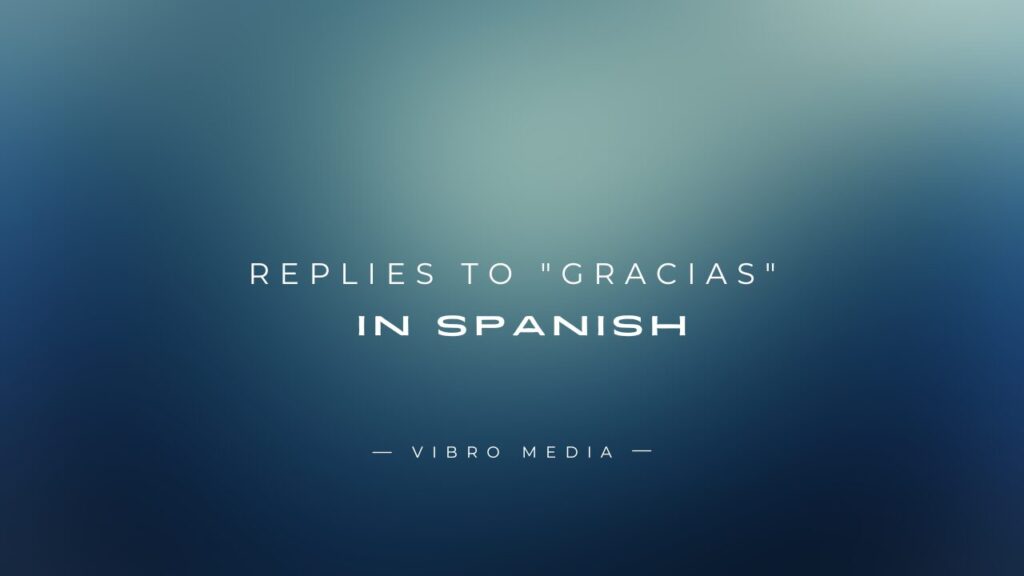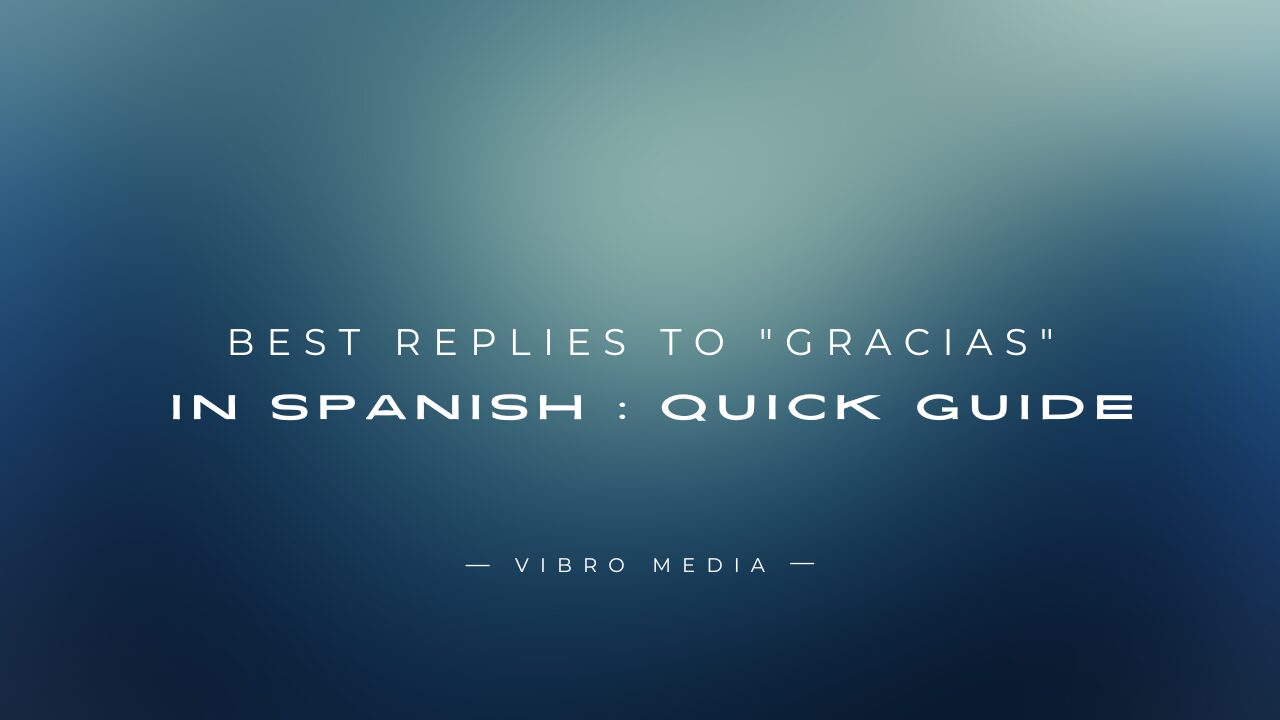Understanding how to respond to “gracias” in Spanish can make your conversations smoother and more enjoyable. In Spanish-speaking cultures, expressing gratitude is not just a nicety; it’s a cornerstone of social interactions. Knowing the appropriate responses can enhance your communication, whether you’re at a bustling café in Madrid or chatting with friends in Mexico City. So, let’s dive into the world of “gracias” and explore how to respond like a pro!

200+ Replies to “Gracias” in Spanish
Formal Replies
- De nada (You’re welcome)
- A usted (To you)
- Con gusto (With pleasure)
- Es un placer (It’s a pleasure)
- No hay de qué (There’s no reason to thank)
- A su disposición (At your service)
- Con mucho gusto (With much pleasure)
- Estoy aquí para servirle (I’m here to serve you)
- Para servirle (At your service)
- Es un honor ayudar (It’s an honor to help)
Informal Replies
- De nada (No problem)
- No hay problema (No problem)
- Todo bien (All good)
- Sin problema (No worries)
- A la orden (At your service)
- ¡No te preocupes! (Don’t worry!)
- ¡Es nada! (It’s nothing!)
- ¡Tranquilo! (Relax!)
- ¡No hay lío! (It’s no trouble!)
- ¡No hay drama! (No drama!)
Gratitude Acknowledgment
- Gracias a ti (Thanks to you)
- Igualmente (Likewise)
- Un placer ayudar (A pleasure to help)
- Me alegra que te sirva (I’m glad it helps you)
- Agradezco tu agradecimiento (I appreciate your gratitude)
- Estoy feliz de ayudar (I’m happy to help)
- Eso me hace feliz (That makes me happy)
- Siempre es un placer (It’s always a pleasure)
- Te lo agradezco también (I thank you too)
- Me alegra que lo aprecies (I’m glad you appreciate it)
Casual or Humorous Replies
- Por nada (For nothing)
- ¡De nada, mi amigo! (You’re welcome, my friend!)
- ¡Con gusto, pero solo por esta vez! (With pleasure, but only this time!)
- ¡No hay problema, solo págame un café! (No problem, just buy me a coffee!)
- ¡Estaba en mi lista de cosas por hacer! (It was on my to-do list!)
- ¡De nada, pero no se lo digas a nadie! (You’re welcome, but don’t tell anyone!)
- ¡A tu servicio, campeón! (At your service, champ!)
- ¡Hazlo tú la próxima vez! (You do it next time!)
- ¡Lo hago por puntos! (I do it for points!)
- ¡Solo si me das un abrazo! (Only if you give me a hug!)
Cultural or Contextual Replies
- Para servirle (At your service)
- Aquí estamos para eso (We are here for that)
- Lo hago con gusto (I do it with pleasure)
- Siempre a la orden (Always at your service)
- Es un placer contribuir (It’s a pleasure to contribute)
- Así hacemos comunidad (That’s how we build community)
- Un honor colaborar contigo (An honor to collaborate with you)
- Juntos siempre mejor (Together we do better)
- Es lo que hace falta (That’s what is needed)
- Un pequeño gesto en la comunidad (A small gesture in the community)
Expressions of Humility
- Es lo menos que puedo hacer (It’s the least I can do)
- Es un pequeño gesto (It’s a small gesture)
- No es nada (It’s nothing)
- Estoy aquí para ayudar (I’m here to help)
- No hay necesidad de agradecer (No need to thank)
- Me alegra poder contribuir (I’m glad I can contribute)
- Lo hice con todo mi corazón (I did it with all my heart)
- Es un placer ayudar a los demás (It’s a pleasure to help others)
- Cada ayuda cuenta (Every help counts)
- Lo hago porque quiero (I do it because I want to)
Affirmative Replies
- Así es (That’s right)
- Exactamente (Exactly)
- Por supuesto (Of course)
- Claro que sí (Certainly!)
- Totalmente de acuerdo (Totally agree)
- Definitivamente (Definitely)
- Sin duda (Without a doubt)
- Afirmativo (Affirmative)
- Así debe ser (That’s how it should be)
- Estoy de acuerdo (I agree)
Supportive Replies
- Estoy contigo (I’m with you)
- Siempre aquí para ayudar (Always here to help)
- Cuenta conmigo (Count on me)
- Me alegra estar aquí para ti (I’m glad to be here for you)
- Juntos podemos (Together we can)
- Siempre a tu lado (Always by your side)
- No estás solo (You are not alone)
- Eso es lo que amigos hacen (That’s what friends do)
- Estoy aquí si me necesitas (I’m here if you need me)
- Lo haremos juntos (We will do it together)
Complimentary Replies
- Eres increíble (You’re amazing)
- Me encanta tu actitud (I love your attitude)
- Eres muy amable (You are very kind)
- Hiciste un gran trabajo (You did a great job)
- Tu esfuerzo se nota (Your effort shows)
- Eres una gran persona (You are a great person)
- Tienes un gran corazón (You have a big heart)
- Me inspiras (You inspire me)
- Eres un verdadero amigo (You are a true friend)
- Te admiro (I admire you)
Cordial Replies
- Con gusto (With pleasure)
- Es un placer (It’s a pleasure)
- Siempre a su disposición (Always at your service)
- Estoy aquí para servirle (I’m here to serve you)
- Aprecio su agradecimiento (I appreciate your gratitude)
- Estoy feliz de ayudar (I’m happy to help)
- Mi placer (My pleasure)
- Con mucho gusto (With much pleasure)
- Para servirle (At your service)
- A su salud (To your health)
Religious or Spiritual Replies
- Dios te bendiga (God bless you)
- Es un regalo de Dios (It’s a gift from God)
- Estoy agradecido/a por ti (I am grateful for you)
- Todo es gracias a Dios (Everything is thanks to God)
- Que Dios te lo pague (May God repay you)
- La gratitud es divina (Gratitude is divine)
- Siempre en mis oraciones (Always in my prayers)
- Todo tiene un propósito (Everything has a purpose)
- La bondad es una bendición (Kindness is a blessing)
- La fe mueve montañas (Faith moves mountains)
Friendly or Colloquial Replies
- ¡No hay problema, amigo! (No problem, friend!)
- ¡Todo bien, compa! (All good, buddy!)
- ¡De nada, colega! (You’re welcome, mate!)
- ¡Siempre es un gusto! (It’s always a pleasure!)
- ¡Así es como se hace! (That’s how it’s done!)
- ¡Me alegra que te sirva! (I’m glad it helps you!)
- ¡Eso es lo que hay! (That’s how it is!)
- ¡No hay lío, hermano! (No trouble, brother!)
- ¡Ya sabes que aquí estoy! (You know I’m here!)
- ¡La próxima vez tú invitas! (Next time you treat!)
Encouraging Replies
- Sigue así (Keep it up)
- Me alegra que te ayude (I’m glad it helps you)
- Siempre adelante (Always forward)
- Lo estás haciendo muy bien (You are doing very well)
- Cada paso cuenta (Every step counts)
- No te rindas (Don’t give up)
- Estoy orgulloso/a de ti (I’m proud of you)
- Tienes mucho potencial (You have a lot of potential)
- Todo esfuerzo vale la pena (Every effort is worth it)
- Continúa brillando (Keep shining)
Playful Replies
- ¡De nada, mi héroe! (You’re welcome, my hero!)
- ¡Así me gusta, más aplausos! (That’s what I like, more applause!)
- ¡Con gusto, aunque me debas una! (With pleasure, but you owe me one!)
- ¡De nada, a tu servicio! (You’re welcome, at your service!)
- ¡Solo cumplí mi deber! (I just did my duty!)
- ¡El placer es todo mío! (The pleasure is all mine!)
- ¡De nada, pero no me llames otra vez! (You’re welcome, but don’t call me again!)
- ¡Me alegra ser tu asistente personal! (I’m glad to be your assistant!)
- ¡Por nada, solo cumpliendo mi misión! (For nothing, just fulfilling my mission!)
- ¡Lo hago con amor! (I do it with love!)
Expressive Replies
- ¡Qué bueno que te sirvió! (So glad it helped you!)
- ¡Me hace feliz poder ayudar! (It makes me happy to help!)
- ¡Siempre estoy aquí para lo que necesites! (I’m always here for whatever you need!)
- ¡Eres genial por agradecer! (You’re great for being grateful!)
- ¡Me alegra que hayas encontrado valor en ello! (I’m glad you found value in it!)
- ¡Eso es lo que me motiva! (That’s what motivates me!)
- ¡Lo hice con mucho amor! (I did it with a lot of love!)
- ¡Tu agradecimiento me llena de alegría! (Your gratitude fills me with joy!)
- ¡Gracias a ti por ser tan amable! (Thanks to you for being so kind!)
- ¡Tu agradecimiento es la mejor recompensa! (Your gratitude is the best reward!)
Humorous Replies
- ¡No hay problema, soy un superhéroe! (No problem, I’m a superhero!)
- ¡De nada, pero no me llames para tareas difíciles! (You’re welcome, but don’t call me for hard tasks!)
- ¡Si necesitas más ayuda, estaré en el sofá! (If you need more help, I’ll be on the couch!)
- ¡De nada, ahora eres mi fan! (You’re welcome, now you’re my fan!)
- ¡Lo hago por mis poderes mágicos! (I do it for my magical powers!)
- ¡No hay problema, estoy en mi día libre! (No problem, I’m on my day off!)
- ¡De nada, solo estoy siguiendo mi plan de dominación mundial! (You’re welcome, I’m just following my world domination plan!)
- ¡Esa es mi forma de hacer amigos! (That’s my way of making friends!)
- ¡De nada, pero solo si me traes pizza! (You’re welcome, but only if you bring me pizza!)
- ¡Lo hago porque soy muy generoso! (I do it because I’m very generous!)
Pragmatic Replies
- Siempre es bueno ayudar (It’s always good to help)
- Esa es la manera de funcionar (That’s the way to function)
- Así se mantiene el equilibrio (That’s how balance is maintained)
- Ayudar es parte de la vida (Helping is part of life)
- Es lo que se espera (It’s what’s expected)
- Esa es la filosofía (That’s the philosophy)
- Es importante ayudarnos mutuamente (It’s important to help each other)
- Todos ganamos (We all win)
- Así se logra más (That’s how more is achieved)
- Es práctico colaborar (It’s practical to collaborate)
Gratitude Exchange Replies
- Gracias a ti por darme la oportunidad (Thanks to you for giving me the opportunity)
- Gracias por tu apoyo (Thanks for your support)
- Agradezco tu confianza (I appreciate your trust)
- Lo hago porque lo mereces (I do it because you deserve it)
- Estoy agradecido/a por tenerte (I’m grateful to have you)
- Tu agradecimiento me motiva a hacer más (Your gratitude motivates me to do more)
- Gracias por ser tan receptivo (Thanks for being so receptive)
- Valoro mucho tu agradecimiento (I really value your gratitude)
- Juntos hacemos un gran equipo (Together we make a great team)
- La gratitud va y viene (Gratitude goes back and forth)
Reflective Replies
- La vida es así, ayudándonos (That’s life, helping each other)
- Cada pequeño gesto cuenta (Every small gesture counts)
- La gratitud es un ciclo (Gratitude is a cycle)
- Ayudar es un acto de humanidad (Helping is an act of humanity)
- Reflexionamos sobre la bondad (We reflect on kindness)
- Lo importante es el corazón (What matters is the heart)
- En la comunidad, todos ganamos (In the community, we all win)
- Cada acción tiene su eco (Every action has its echo)
- La gratitud nos une (Gratitude unites us)
- La vida es un intercambio de favores (Life is an exchange of favors)
Social or Community-Focused Replies
- Es un placer ayudar a la comunidad (It’s a pleasure to help the community)
- Juntos hacemos la diferencia (Together we make a difference)
- Así construimos la comunidad (This is how we build the community)
- Todos somos parte de esto (We are all part of this)
- Es un deber cívico ayudar (It’s a civic duty to help)
- La unión hace la fuerza (Unity makes strength)
- Ayudar es nuestra responsabilidad (Helping is our responsibility)
- La comunidad se fortalece con cada gesto (The community strengthens with every gesture)
- Lo hacemos por el bien de todos (We do it for the good of all)
- La gratitud se comparte en comunidad (Gratitude is shared in the community)
The Importance of “Gracias”
- A Sign of Gratitude in Hispanic Culture
In Hispanic culture, saying “gracias” (thank you) is not just polite; it’s a way to acknowledge kindness and generosity. Gratitude is celebrated from small gestures, like holding a door, to significant acts. It’s important to note that saying “gracias” can reflect humility and respect. It’s more than a word; it’s an expression of goodwill that fosters more robust relationships.
- Why It’s Important to Respond
Responding to “gracias” is equally important. It acknowledges the gratitude expressed and continues the flow of conversation. Not responding can come off as rude or dismissive, even if that’s not your intention. A friendly reply can make a world of difference and help build connections.
Simple Acknowledgements
- “De nada”
One of the most common ways to respond to “gracias” is with “de nada,” which translates to “it’s nothing.” This simple and effective phrase conveys that you were happy to help without making a big deal.
Example:
“Gracias por ayudarme con el proyecto.”
“De nada, siempre estoy aquí para ayudar.”
- “No hay de qué”
Another typical response is “no hay de qué,” which also means “no worries” or “there’s no need to thank me.” This phrase is slightly more formal and can be used casually and professionally.
Example:
“Gracias por el consejo.”
“No hay de qué, me alegra que te haya servido.”
More Elaborate Responses
- “Para eso estamos”
For a warmer and more personalized touch, you can say, “para eso estamos,” meaning “that’s what we’re here for.” This response implies a sense of community and support, making it perfect for friends or family.
Example:
“Gracias por escucharme.”
“Para eso estamos, siempre puedes contar conmigo.”
- “Es un placer”
When you want to convey that it was indeed your pleasure to help, “es un placer” (it’s a pleasure) is a great choice. This response can add a friendly tone and show that you enjoyed the interaction.
Example:
“Gracias por tu ayuda con el informe.”
“Es un placer, me encanta colaborar.”
Formal vs. Informal Situations
- Choosing the Right Tone
Your response to “gracias” can vary based on the context. A casual reply works best in informal settings, like chatting with friends. However, opt for a more respectful response opt for a more respectful response in formal situations, such as business meetings or with someone you don’t know well.
Examples of Different Scenarios
- Informal:
“Gracias por la fiesta.”
“¡De nada! ¡Fue muy divertido!” - Formal:
“Gracias por su apoyo.”
“No hay de qué, es un honor ayudar.”
Responses in Different Spanish-Speaking Countries
- Mexican Responses
In Mexico, responses can be more playful. Phrases like “con gusto” (with pleasure) or “a la orden” (at your service) are commonly used. These responses reflect the friendly and hospitable nature of Mexican culture.
Example:
“Gracias por el favor.”
“Con gusto, ¡siempre estoy aquí para ayudar!”
- Responses in Spain
In Spain, while “de nada” is widely used, you might also hear “para servirle” (to serve you) in more formal contexts. Spaniards appreciate a bit of flair in their conversations!
Example:
“Gracias por la ayuda.”
“Para servirle, siempre a su disposición.”
How to Make Your Response More Engaging
- Using Humor
If you’re comfortable, sprinkling a bit of humor into your response can lighten the mood. A witty remark or a playful comeback can make the interaction memorable.
Example:
“Gracias por el café.”
“¡De nada! Ahora que tengo tu atención, ¡hablemos de mis talentos ocultos!”
- Incorporating Personal Stories
Another way to engage is by sharing a brief personal anecdote about the situation. This can create a connection and make your response more relatable.
Example:
“Gracias por la invitación.”
“De nada, me recuerda a aquella vez que tuvimos una cena increíble en tu casa.”
Common Situations to Practice Responses
- Everyday Conversations
Think of scenarios where you might hear “gracias.” Practice your responses mentally or with friends. This will help you feel more confident in real situations.
- Social Gatherings
Social events are great opportunities to practice. When someone thanks you at a gathering, respond promptly. The more you practice, the more natural it will become.
Conclusion
In conclusion, mastering the art of responding to “Gracias” in Spanish can significantly enhance your conversational skills and help you connect with others meaningfully. With over 200 creative and thoughtful replies, you’ll be well-equipped to navigate various social situations confidently. Remember, language learning is a journey; every interaction is an opportunity to improve. If you’re interested in expanding your repertoire of clever responses even further,
Check out our guide on:
200+ Replies When a Guy Says “Make Me” Challenge!
FAQs
“De nada” translates to “it’s nothing,” it is commonly used in Spanish to respond to expressions of gratitude.
Q. Are there different ways to say “you’re welcome” in Spanish?
Yes, other common responses, depending on the context, include “no hay de qué,” “para eso estamos,” and “es un placer. “
Q. How vital is cultural context in language responses?
Cultural context plays a significant role in communication. Understanding local customs can enhance interactions and prevent misunderstandings.
Q. Can humor be used in formal situations?
While humor can lighten a conversation, it’s essential to gauge the setting and the individuals involved. In formal situations, it’s safer to stick with respectful responses.
Q. How can I improve my Spanish conversation skills?
Practicing regularly, engaging in conversations, and exposing yourself to Spanish media are excellent ways to enhance your language skills. Consider joining language exchange groups or taking classes to boost your proficiency further.











Simply desire to say your article is as surprising The clearness in your post is simply excellent and i could assume you are an expert on this subject Fine with your permission let me to grab your feed to keep up to date with forthcoming post Thanks a million and please carry on the gratifying work
Houzzmagazine I appreciate you sharing this blog post. Thanks Again. Cool.